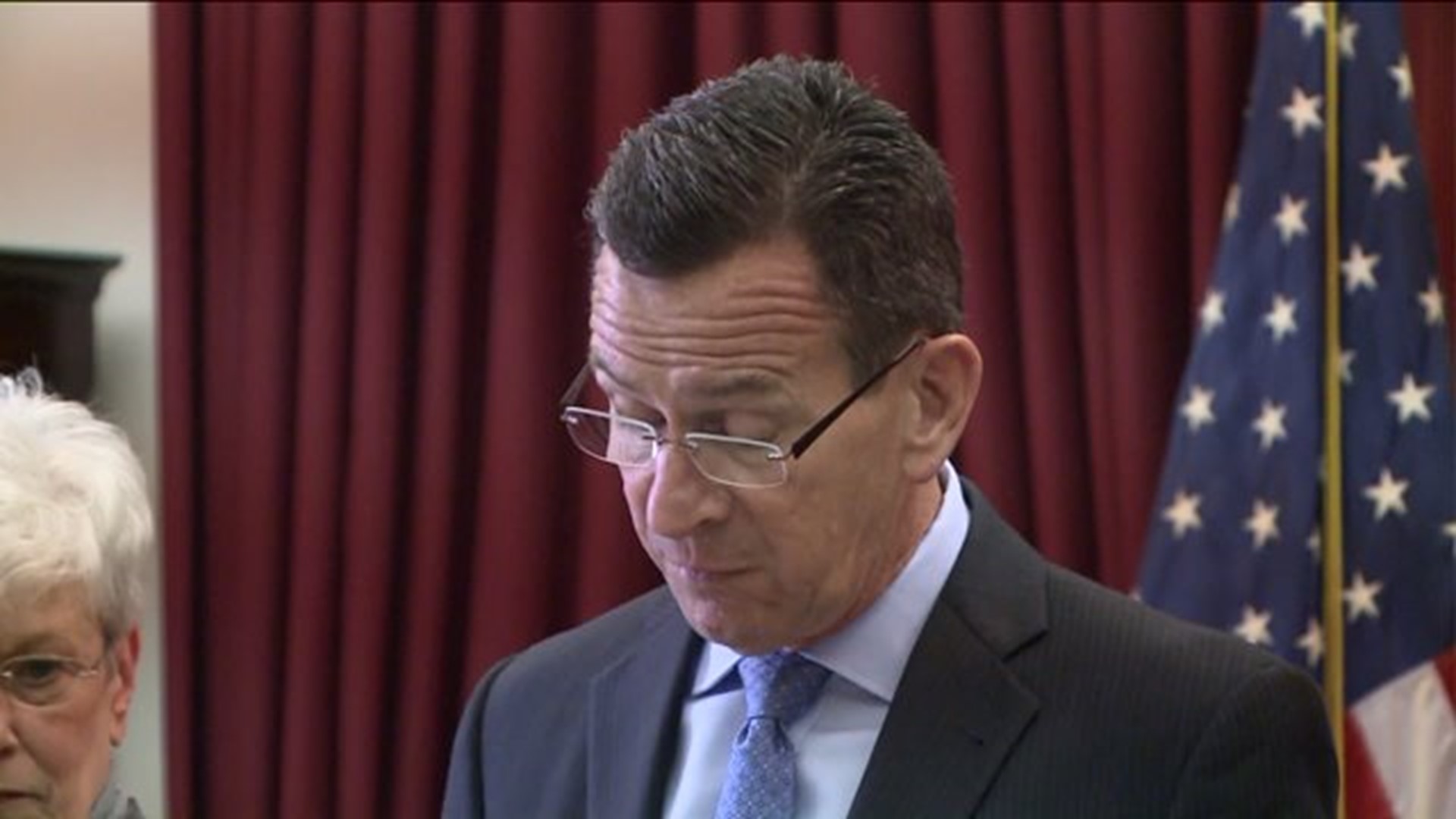HARTFORD -- Connecticut Gov. Dan Malloy unveiled an updated budget on Tuesday that cuts spending in an effort to cover next fiscal year's entire deficit, which has grown to as much as $922 million.
The new plan does not include any state tax increases, which was something that has been promised throughout the negotiations.
Malloy also provided an update to the number of positions being eliminated. He said that 2,500 positions would be eliminated, but that can include retirements and leaving open positions unfilled; it is not going to be all layoffs.
On Tuesday, a 71 layoff notices were handed out in three departments: at the Department of Social Services (43), the Department of Mental Health and Addiction Services (24) and the Department of Economic and Community Development (4). On Monday, 165 layoff notices were sent to employees at the Department of Children and Families and the Department of Mental Health and Addiction Services.
Another aspect unveiled on Tuesday in the new budget is that non-union employees and elected and appointed officials will have to contribute 20 percent of their health care benefits, which Malloy said is part of "leadership" and that the $5 million in annual savings will help. Currently, those employees pay an average of 12 percent.
Malloy also proposed scrapping a plan to redirect some sales tax revenues to municipalities, which would have reduced property taxes. The Municipal Revenue Sharing Fund would have been the first time that towns got a portion of state sales tax revenues. Because of this, the Connecticut Conference of Municipalities says that the governor's statement that taxes won't increase is in reality false because it's only referring to state taxes.
"The proposal will result in tax hikes and service cuts for residential and business property taxpayers," the statement from the CCM said. "CCM calls on the General Assembly to reject these deep cuts in state aid – proposed so late in the legislative session after many communities have approved their local budgets."
As for how much that lost revenue will impact towns, the CCM says that forgoing the sales tax revenue sharing fund will result in "reducing municipal revenue from $109.3 million to $17.3 million; and cutting Education Cost Sharing (ECS) Grants by over $53.4 million and other miscellaneous education grants by $6.2 million...Nearly 30 communities would lose their ECS grants entirely."
Malloy said in a statement this is the best budget presented so far to cover the deficit. "Falling under the statutory spending cap, this is the only budget presented thus far that tackles the full scope of the challenge," the press release about the budget stated.
"We have an obligation as elected officials to tackle the full scope of our challenge. That means we must align our spending with the revenue we actually have, not the revenue we wish we had. Our expectations need to change – we cannot afford to fund everything we always have. And we need to change the way we budget," Gov. Malloy said in a statement. "If we are to do what's right for the state, if we are to put Connecticut on a better path for the long-term, then we need to make tough but necessary decisions now to adapt to our new economic reality. That’s what this budget does."
The Democrat already released a budget proposal back in February, but that document was based on a January deficit projection, when the shortfall was $570 million. Malloy said this plan covers a $922 million deficit.
The unusual release of a second gubernatorial budget proposal comes days after the General Assembly's two Democratic controlled budget committees approved spending and tax plans that only covered a projected $570 million deficit, leaving an approximate $363 million hole. Malloy mentioned in a press conference that Republicans haven't released any proposal for a budget, and the Democrats' "didn't do the job."
After the release, Republican leaders released their own statement. Senate Minority Leader Len Fasano and House Republican Leader Themis Klarides said:
We thank the governor for recognizing the full scope of the state’s sizable deficit, however the path to attain long-term fiscal stability is not through layoffs and budget cuts alone. They address the effect, but they do not alleviate the cause. We need to focus on rethinking policies to ensure our state lives within its means moving forward. We need to budget for generations, not elections.
Republicans recently proposed over a dozen long-term initiatives to move our state forward. At the very least, we are calling on legislative leaders to make changes including but not limited to the following three: (1) mandatory approval of labor contracts by the General Assembly, (2) capping bonding, and (3) creating an Office of Overtime Accountability.
When the clock was running out on the current fiscal year, lawmakers worked together to successfully resolve the 2016 deficit. We acted quickly, knowing that 2017 would provide us with an opportunity to make more lasting changes and help put an end to the perpetual cycle of budget deficit after budget deficit. Now is the time to act and implement structural changes. Any 2017 budget that lacks these long-term policy changes only sets us up for more failure in the future. If Democrats want to make this a bipartisan process, their legislative leaders need to commit to closing the deficit of over $900 million in full and making significant structural long-term policy changes.
Ultimately, Malloy and legislative leaders will likely come up with a final budget compromise for lawmakers to consider. The legislative session ends May 4.

